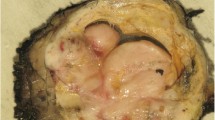Abstract
A comparative analysis of the differentiation pattern, the proliferative behaviour, and the level of apoptosis between human benign and malignant neoplasms of smooth-muscle (SM) tissue is lacking. The clinical, histopathological, immunochemical, and immunocytochemical features of leiomyomas (LM) and leiomyosarcomas (LMS) were investigated by a panel of monoclonal antibodies specific for some differentiation markers of SM tissue (SM myosin and α-actin, desmin, and SM22) and for markers of non-muscle tissue (vimentin and non-muscle myosin). Proliferating normal and neoplastic cells were identified by proliferating-cell nuclear antigen (PCNA)/Ki67 immunostainings and the apoptotic cells were revealed by means of the terminal-deoxynucleotidyltransferase-mediated dUTP nick-end labelling technique. Gel electrophoresis and Western blotting, performed with anti-(SM1/SM2 myosin isoform) antibody, indicated quantitative differences between LMS and LM, which mirrored higher positive to negative nuclear ratios for PCNA, Ki67 and apoptosis in malignant as opposed to benign neoplasms. With LM, however, a similar SM1 to SM2 ratio could be associated with different proliferation levels. Uterine, gastric and intestinal LMS displayed specific patterns of SM1/SM2 and/or non-muscle myosin expression that were not paralled by different levels of proliferation/apoptosis. While the level of PCNA/Ki67 correlated with the level of apoptosis in normal SM tissues and LM, that of LMS did not. In vivo at the cellular level, LM and uterine LMS displayed a near-uniform SM tissue differentiation, whereas the other LMS displayed a lesser or a heterogeneous immunoreactivity. In vitro, cultured LMS cells showed a limited and peculiar expression of SM myosin. In conclusion, there is no reciprocal relationship between degree of differentiation and the level of proliferation, as exemplified by the finding that the less differentiated intestinal LMS displays the lowest proliferative behaviour and that the relatively more differentiated gastric LMS/metastasis is more proliferative.
Similar content being viewed by others
Author information
Authors and Affiliations
Additional information
Received: 15 July 1997 / Accepted: 16 October 1997
Rights and permissions
About this article
Cite this article
Valenti, MT., Azzarello, G., Vinante, O. et al. Differentiation, proliferation and apoptosis levels in human leiomyoma and leiomyosarcoma. J Cancer Res Clin Oncol 124, 93–105 (1998). https://doi.org/10.1007/s004320050140
Published:
Issue Date:
DOI: https://doi.org/10.1007/s004320050140




